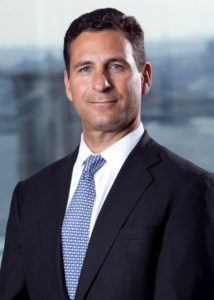When you’re a smaller athlete competing with giants, sheer determination and sharp reflexes are tools you might use to glide past opponents—and a winning formula in business isn’t too different, according to one insurance leader.
Executive Summary
A culture of responsive risk takers sets Allied World apart from larger competitors, according to Lou Iglesias, who explains that a recent organizational change, creating a Global Insurance operation, will help him—as CEO of the worldwide segment—to ensure that the culture is consistent around the world.Related article: At about the same time as Iglesias quietly took the reins of Global Insurance without any formal public announcement, Allied World was capturing headlines externally, with Toronto-based Fairfax Financial Holdings Ltd. closing a $4.9 billion deal to acquire all of Allied World. (See related article: “New Uniform, Same Team Culture: Allied World Post-Fairfax Deal“)
“We punch way over our weight,” Lou Iglesias, the chief executive officer of Global Insurance for Allied World, told Carrier Management several times during a recent hour-long interview at the company’s New York offices in late September. In the world of insurance, Iglesias describes Allied World as a midsize insurer operating in a large-account world against insurers with 20-times as many employees.
“We don’t have the 20,000 people, 30,000 people running around and pushing our products. So, we’ve always had to fight different ways,” he said, comparing the staffs of commercial lines behemoths to Allied World’s workforce of 1,074 employees devoted to insurance worldwide (1,433, including reinsurance operations).
“We’ll do three-and-a-half billion dollars all in this year,” he said, referring to gross premiums for both the insurance and reinsurance operations globally. “But we compete with the big players.”
Since Iglesias joined the company in 2012 with an initial charge to build out Allied World’s U.S. insurance operations, gross insurance premiums in the region have jumped almost 50 percent, from less than $1 billion at year-end 2012 ($994 million) to $1.5 billion in 2016—an average growth rate of 10 percent. Having a good number of people on staff who have dealt with large accounts and sophisticated insureds partially explains Allied World’s ability to stay in contention with bigger competitors to win and retain business, according to Iglesias. More to the point, he said the culture of the organization is key. “We have always had to have a culture of being responsive because we haven’t had the huge size.”
Leading a Single Culture
Iglesias actually wasn’t answering a question about Allied World’s secret sauce when he brought up the idea of a cultural competitive edge. Instead, he was explaining how his leadership role changed near the end of the second quarter, when he moved from being president of Allied World’s North America Insurance operations to a newly created position as head of Global Insurance—an organizational segment putting together the North America (U.S., Canada and Bermuda) and International (Asia-Pacific, Europe and U.K., and Latin America) operations under Iglesias’s purview. “Our culture here is really important to us. Making sure that we have that consistent culture globally is important, and having this global operation is going to help us do that,” he said, highlighting one benefit of the change.
“We’ve always kept a very flat organization. We don’t have layers of bureaucracy,” he said, suggesting that close ties between leaders and employees are another feature of a responsive culture that extends outward to customers. “We have always needed to be very responsive and creative because we’re a midsize company.”
What are some of the visible signs of the common global culture? How would a visitor to an office in Miami or London or Bermuda know that they entered an Allied World location without looking at the signage?
Iglesias said a cultural thread that weaves across Allied World’s 21 offices across the globe is high energy. “You would see people who are passionate. You would see people who understand what their goals are. You would see people who know and have relationships with the senior management of the company, which I think gives them confidence,” he said.
“I think you’d see people who are excited about their jobs. A lot of people use the term ‘entrepreneurial,’ and we have kind of needed to be that way. We try to bring people into the company who are that way because we’re competing with some of the larger carriers out there. We don’t have as many resources as they have…We have to make it up in hustle, and being passionate, and being responsive, and having great products—making sure we’re bringing something that’s valuable to the table” for customers.
“We always had to be a little bit different than the other guys to win. Our culture perpetuates that.”

Still, the names of “the other guys” appear on the résumés of Iglesias and a good chunk of the staff members at Allied World—most notably one of the largest carriers in the specialty commercial insurance space, American International Group. A simple search of Allied World executives on LinkedIn (with the title vice president or higher) reveals that just over one-quarter have worked at AIG at some point. So, how does Allied World remain a separate and distinct culture, without turning into a mini-AIG, or Travelers, or Chubb, or other large commercial insurer?
In fact, Allied World seeks out people who are motivated to step away from the security of a large company environment early in the hiring process. “One of things I’ll say to candidates who think they would like to come here is that our company is not for everybody,” Iglesias said.
“A lot of people say they want to come in and start something. They think they want to be entrepreneurial, but it’s not really in their nature. They’re more comfortable in an established company that is mature, where they come into work and they have a book of business. And that’s fine. But a certain type of person does like to come in and start something from scratch and build it up and take some risks in their career,” he said, going on to give more details of the steps that Allied World has taken to expand its business organically in recent years.
“We’ll identify a product that we like and a person and a team that we like, and then we’ll say build us a three-year business plan…And we expect profitability after three years.” Before onboarding potential entrepreneurs, “we’ll take them through that process of really thinking about what it’s going to take” to get there. “We’ll ask, ‘Have you thought about systems? Have you thought about distribution? Have you thought about the fact that you’re going to be the new kid on the block now?'”
“Either they come out of that thought process really excited or they say, ‘This might not be for me.’ It’s better to find out then,” Iglesias said. Making sure to get the right person is the first step in maintaining a culture of responsive risk takers, he said.
Construction Trade to Culture Builder
Iglesias himself took a career risk when he accepted an opportunity at Allied World in 2012 after spending nearly two decades at AIG in roles that included president of AIG Environmental, president of AIG Construction, CEO and chair of AIG’s Risk Management group, and ultimately CEO of Commercial Casualty in the Domestic Brokerage group.
Recalling early days of corporate turmoil at AIG in the wake of the financial crisis, Iglesias said he chose to stick it out and stayed for a few years. “Through the financial crisis, it became very tough there and things were changing. The company was changing,” he said. Then Allied World CEO Scott Carmilani and Iglesias’s predecessor in the role of president of Allied World’s North America Insurance operations, Gordon Knight, started talking to him.
Carmilani has been with Allied World since 2002; Knight joined in 2008. Both are also AIG alumni.
“It seemed like a great opportunity with a young, growing company, and it sounded very exciting. All that has panned out,” Iglesias said, noting that when Knight retired in 2014, Iglesias took his role as president of North America.
Although Iglesias’s career in insurance now spans over 30 years, including 18 at AIG, commercial specialty insurance definitely wasn’t the initial career path that he had in mind when he worked his way through college in his uncle’s construction business. He fully expected to continue building—with bricks and cement—long after graduation. But a downturn in the construction industry and a command from his uncle to “go find something else” to do led the young builder to share his sad state of affairs with a friend. That friend’s father happened to be a gold agent for Travelers, and the agent opened the door to a new career, setting up an interview.
“Back then the industry was actually training people. So, they sent me to Hartford for six months in their underwriting training school,” Iglesias said, which gave him the tools to start work as a commercial underwriter for middle-market risks in the Long Island, N.Y. office.
Two-and-a-half years later, his love of the construction trade made a move to a position at construction insurance broker Allied Coverage an easy initial sell. But the carrier side of the business ultimately had more appeal. “I like the underwriting and being the capital and the risk taker,” he said, explaining his next move into Reliance National’s construction group as a senior underwriter, and finally to AIG in the early 1990s.
At AIG, Iglesias, the underwriter, had a chance to be involved with some of the largest construction projects in the world, just as Allied World underwriters do today. “We were involved in so many things, and we had the ability to be in front of anybody,” he said, recalling a call he received from the city of New York two days after the 9/11 attacks. He was running AIG’s construction division at the time but working from home because AIG’s downtown offices were inaccessible. “We had relationships with the city because we underwrote most of their construction. They said, ‘Lou, we need help. We’ve got people showing up on [the World Trade Center] site. We’ve got fireman, we’ve got trucks coming down, civilians. Everybody wants to try and help. But we have no contracts. We have no insurance.'” Together with his former boss at the construction broker, he went down to the site and reached out to other people he knew in the industry to build capacity for a program proposal.
Carrying his affinity for the construction industry to his position at Allied World, Iglesias said construction was the first area of buildout in North America when he came on board, starting with primary construction casualty and environmental contractors in 2012, with new divisions devoted to surety and architects and engineers coming later in 2013 and 2014. “I do have a lot of passion about [construction] because it’s my roots.”
These days, as CEO of Global Insurance, Iglesias sees building culture as a focal part of his latest leadership role. “It gets back to the nature of the flat organization being important to culture. Our people will hear from me a lot, and they’ll hear from Scott. We’re talking to them constantly. This is what our company is about.”
“I’ll do town halls. I travel a lot, I go see everybody…Then what is really satisfying is when you hear it bubble back to you. Culture can’t be just me saying this is our culture or me behaving a certain way. Culture has to bubble up through the entire organization.”
A question Iglesias said he’ll ask his Global Insurance team members on a typical trip to a regional office is, “Who are my cultural heroes?” He wants to know: “When I go see all the brokers out there, who are they going to be talking about all the time as being the most responsive? The most responsible? Who is going to create that profile for the company?”
Iglesias appreciates the big responsibility these heroes have. “It is extra hard when you launch these regions—when you start out with maybe three people in San Francisco and they’re far away from here.”
“Today, you go to San Francisco and there are 30 people,” he said, reporting one typical outcome of an organic growth plan that is mapped out line-by-line and office-by-office. (See related article, “Allied World in North America: A Growth Story.”)
Leadership Style
Asked to describe his leadership style, Iglesias said, “I guide people but don’t get in the way.”
 Lou Iglesias on Culture
Lou Iglesias on Culture
“A certain type of person does like to come in and start something from scratch and build it up and be entrepreneurial and take some risks in their career.”
“Our culture here is really important to us. Making sure that we have that consistent culture globally is important, and having this global operation is going to help us do that.”
“A lot of our team building is actually in real time because we’re not a $50 billion company where we never get to see each other. We actually see each other a lot.”
“There’s no place for big egos. It’s not about who gets credit. Everybody needs help.“
“I am a team builder. It’s all about team.” At a town hall just days before the interview, Iglesias said he told employees, “We’re in this new organization now—Global Insurance—and there’s no place for big egos. It’s not about who gets credit. Everybody needs help.”
“I stress team all the time,” he said. “Some people will have some strengths that others don’t have. Don’t pretend you know everything. The group is always there to help.”
Iglesias also said he spends a lot of time listening to his people to learn what resources they need to succeed. “I think by doing that they give me true answers. But I hold people accountable, and I expect people to want to be held accountable. Those are the type of people we want. If there’s a mistake made, you own up to it, and we fix it and move on.”
How did he come about his leadership skills? Iglesias didn’t mention books or leadership courses. “I think I’m probably a little more of a people person. It’s a combination of people and also technical…As you get higher up in an organization, there are more people you have to lean on to get things done. And the more you take on, the more there is to learn—the more likely it is that somebody else knows more about something than you do.”
That means leaders need to make sure all the people with expertise needed for the organization are motivated to succeed and feel that they have appropriate resources. “I spend a lot of time thinking about that…I don’t want any of my folks to be unmotivated. I think that’s a real key to succeeding. It allows people to think about what they need to do to succeed.”
Iglesias believes that participating in sports—baseball, football and ice hockey, in particular—may have played a role in shaping his leadership style as team enabler. A second influencer was probably his upbringing, he said. “I was raised basically by my mom. She taught me a lot of lessons in strength, how to deal with tough situations, and how to be calm in a crisis situation or deal with groups of people and make sure that you’re moving in the right direction.”
The CEO revealed that he still plays a bit of ice hockey with business associates and friends. In fact, the Allied World hockey team played a game last year against one of the brokers.
Still, most of the team activities that take place at Allied World aren’t formal, Iglesias said. “A lot of our team building is actually in real time because we’re not a $50 billion company where we never get to see each other. We actually see each other a lot,” he said.
As for the challenges for the team that lay ahead, Iglesias said the question that keeps him up at night is, “Are we missing opportunities?”
“We still have room to run, [so] I am constantly thinking about whether there is an opportunity. Have we missed one? Are we bubbling them up? Are we being quick enough in identifying things? Are we being quick enough to move into different markets? Are we training our people well?”
“If we train our people well, if we stay on top of our game, if we continue strong relationships and trust, a lot of the things that keep you up at night won’t happen. So, I focus on the basics of that,” he said.





















 How Americans Are Using AI at Work: Gallup Poll
How Americans Are Using AI at Work: Gallup Poll  Modern Underwriting Technology: Decisive Steps to Successful Implementation
Modern Underwriting Technology: Decisive Steps to Successful Implementation  20,000 AI Users at Travelers Prep for Innovation 2.0; Claims Call Centers Cut
20,000 AI Users at Travelers Prep for Innovation 2.0; Claims Call Centers Cut  Insurance Groundhogs Warming Up to Market Changes
Insurance Groundhogs Warming Up to Market Changes 




